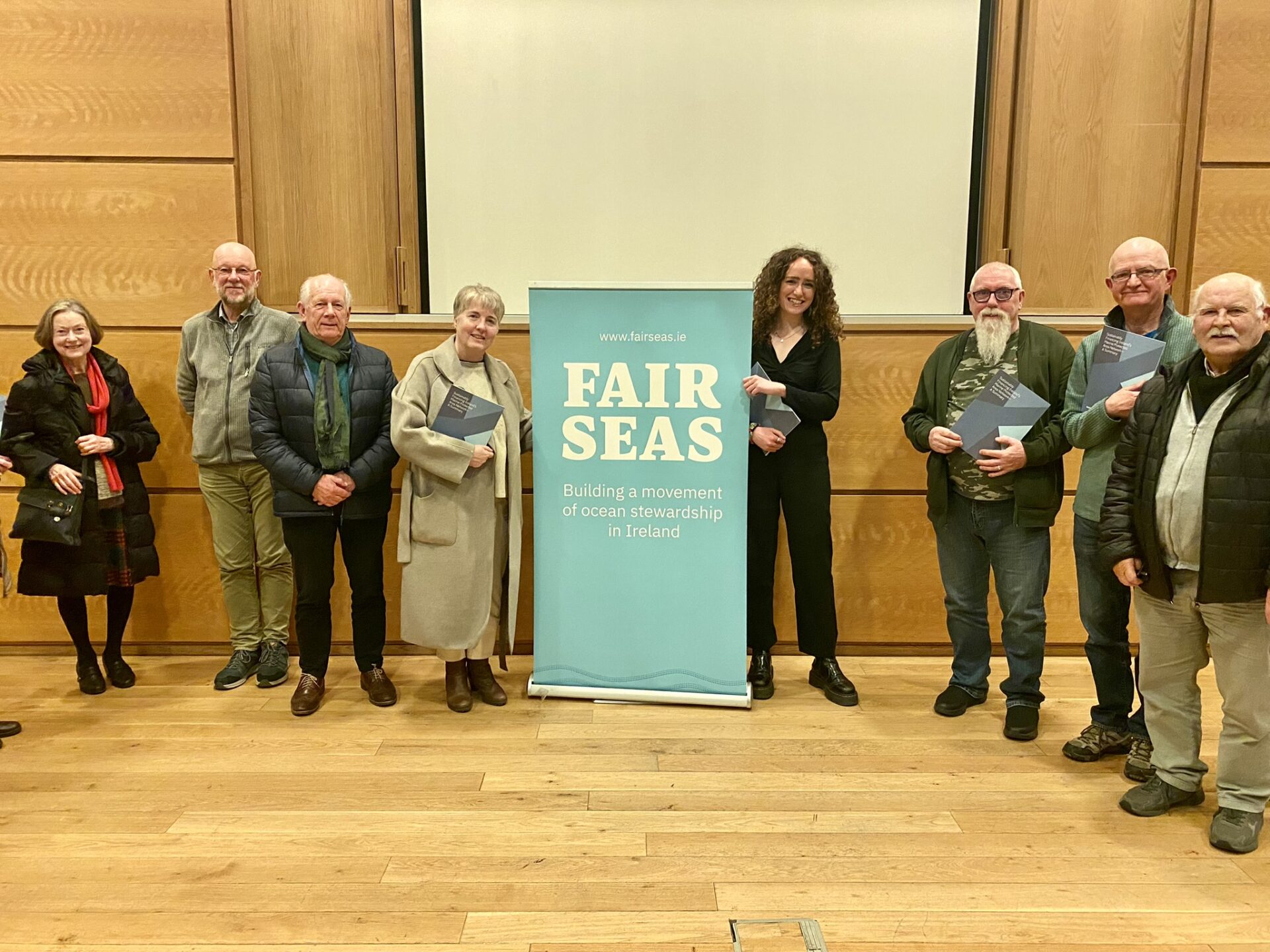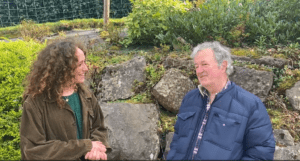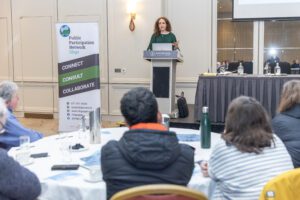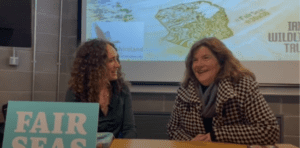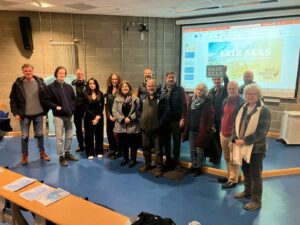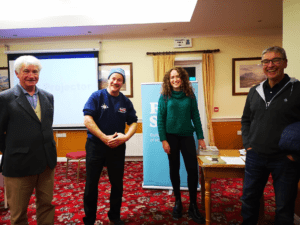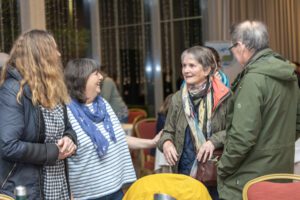Over the past few months, I have had the pleasure and privilege of meeting BirdWatch Ireland branch members across the island to talk to them about the Fair Seas campaign and its ambition to protect 30% of Irish waters by 2030.
The talks have given me an unparalleled opportunity to meet local groups and discuss the forthcoming Marine Protected Area legislation. However, these talks have been about much more than simply transmitting information. They’ve been about celebrating the efforts, knowledge, and expertise of BirdWatch Ireland branches up and down the country; and most importantly, listening to what they can teach us.
Rosalind talking to Michael, Chairperson of BirdWatch Sligo branch
Against the backdrop of local and EU elections, as well as a potential General Election, political distrust is running high. Meanwhile, belief in the power of local action to generate change is at an all-time low. This is evidenced by my experiences with groups where there are often sighs that “we keep electing the wrong people”, frustrations that “sure, nothing will change” and disappointment that “they’re all the same”. With report after report telling us that Ireland’s marine life is at breaking point and that Ireland’s emissions are rising, is it any wonder that individuals feel powerless?
Yet, despite all this, as I travel to a new region every month to talk to branches, I return home ever more convinced of the importance of local action as a tool to empower groups to assume a greater and more influential role in protecting the marine environment.
Rosalind presenting at ‘Celebrating Our Marine Environment’ in Sligo
Why is local action important?
As part of the Fair Seas campaign, I was particularly interested in speaking with branches situated along the Irish coast. I’ve travelled to Dublin, Wicklow, Cork, West Cork, Limerick, and Sligo in the last six months alone. As you can imagine, the marine interests of branches differ depending on location. The urban branches in Dublin raised questions around waste management and pollution, the branches in Cork and West Cork were worried about overfishing, and the branch in Wicklow were concerned about offshore wind farms.
Where many environmental campaigns are criticised for being too ‘Dublin-centric’, leaving behind other parts of the country, one of the strengths of the Fair Seas campaign has been in its genuine effort to capture the fuller picture. Liaising with the branches to co-organise the series of Fair Seas talks (arranging times, dates, and venues) has been time and labour intensive – and, for me, it’s meant a lot of time on trains! But our determination to take our message nationwide demonstrates a commitment to championing local, community-led action as an effective policy response.
Rosalind talking to Moya, Secretary of BirdWatch Ireland Limerick branch
Local action gets some push back, and it can often feel detached from the broader ecosystem of policymaking. However, through meeting branch members at these talks, I’ve seen how local action unlocks the potential for groups to meaningfully address biodiversity decline as it manifests in their area.
Local action is much more responsive to conditions on the ground, and it’s easy to adapt and scale in a way that national actions are not. As politicians know, local action also has an inherent legitimacy with people. Some top-down approaches are out of touch with the realities of peoples’ lives but community-led action accurately represent issues on the ground. This is critical in the case of marine protected areas because locals who use and depend on the sea every day can provide invaluable information on the kinds and levels of activity occurring in the marine environment.
Rosalind and Grace Carr, Marine Advocacy Officer at Irish Wildlife Trust, pictured with BirdWatch Ireland and Irish Wildlife Trust Limerick branches
Local stories sometimes capture more than statistics
In my talks, I give an overview of the rapid decline in some of Ireland’s most iconic species, like the critically endangered angel shark which has suffered a staggering 90% population decline since the early 1900s. I go through the recently published seabird census (2015-2021) which finds that the Puffin, a Red-listed bird of conservation concern, is under serious threat of extinction. I talk about recent assessments indicating that 65% of Ireland’s coastal habitat types are ecologically unhealthy.
There’s no doubt that looking at the science is important; evidence-based research underpins all our policy and advocacy work at BirdWatch Ireland. But it is the stories of branch members, talking about their life-long associations with the sea, which brings this science to life.
For example, when I was in Cork, one woman talked about using sea water to cook potatoes as a child, something she’d stopped doing by the late 70s as water quality changed dramatically. Cooking potatoes in sea water is something I could never imagine doing. It’s a very visual anecdote, one which speaks to just how far the quality of the sea around that coast has deteriorated.
Rosalind and Dolf D’Hondt, Chair of Fair Seas Steering Committee, pictured with BirdWatch Ireland West Cork branch members
Part of the solution
It’s easy to think of the main aims of BirdWatch Ireland branches as supporting individuals to take practical conservation and protecting Irish birds. Really, the impact does not stop there. They do so much more.
If my experience of bringing the Fair Seas campaign to local branches offers just a glimpse of what environmental protection could look like in Ireland, then there are many reasons to be hopeful.
On the road, I’ve witnessed how branches have built civic pride, bolstered community, contributed to social cohesion, enhanced health and wellbeing, fostered skill development, provided a forum to raise awareness about a wide range of environmental issues, and critically, instilled in people a sense of agency and confidence to kick-start and lead projects in their area.
The work of BirdWatch Ireland branches shows us that a nature rich and healthier world is not only possible, it’s already actively being created.
Get involved
BirdWatch Ireland has active branch networks in 20 counties. They vary in size and are entirely volunteer led. Branches hold talks and events throughout the year which are often open to the wider public. You can find out more about upcoming events on the branches’ respective social media pages, the BirdWatch Ireland website and in our Wings publication.

